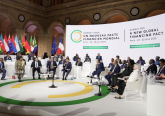After the Cold War and the fall of the First Italian Republic, Italy struggled to formulate a coherent foreign policy strategy. Generally, foreign policies at global level during the Cold War era were dictated by the bipolar relationship between the United States and the Soviet Union. Italian foreign policy, therefore, was a function of the United States’ sphere of influence and interests, and Italy was often a bridge and interlocutor for the Americans to the Middle East or Eastern Europe. With the collapse of the bipolar system and the disintegration of the major Italian political parties that were the core political actors in the aftermath of World War Two, Italian foreign policy was partially dictated by individual figures and was characterized by inconsistency and uncertainty. The collapse of international bipolarism, the uncertainty of American hegemony, and the fragmentation of power between different states has led Italy to a foreign policy that is often based on tactics, but almost never based on strategy. In fact, Italian foreign policy has been moving between positions of strong Europeanism—pushed by the “heart” or, more rarely, pulled by the “head”—or aiming to reinvigorate the American alliance. The latter is often done to signal some Italian parties who became ruling parties’ the detachment from the past or the positions of new ones that wanted to signal adherence to traditional practices. In recent years, there have been tactics—hasty, clumsy and short-lived—of approaching Russia and China and distancing from the European Union. Hence, the strategic aims by the Italian foreign policy since the 1990s have not been clear. Fortunately, the diplomatic Italian service (“la Farnesina”) has maintained high quality of diplomacy, though often in absence of a secure political lead.
However, 2021 presents an opportunity for Italy to strengthen and better define its foreign policy. This is due to the rising prominence of foreign policy issues relevant to Italy, recent leadership changes in other countries, and conjunctural opportunities in some global institutions.

Right now, there are significant changes occurring in respect to global leadership. The United States president Joe Biden seems to be moving towards the logic of multilateralism. Under his leadership, issues such as climate change, global governance on health, and UN peace operations are returning into the White House agenda. Angela Merkel, perhaps the most important European political leader in the last 15 years, will leave the scene with the German elections of September 2021. The United Kingdom is no longer part of the European Union, which has produced a new institutional balance in the EU. It could seem that Emmanuel Macron’s France has a very wide space for action in 2021. However, Macron will face his first regional elections in 2021, and he will start investing great part of his own time for his campaign for the 2022 presidential election.
Hence, Italy can play a role in rebalancing French and German preponderance within the European Union. And perhaps, Italy can benefit from a Portuguese presidency of the EU Council until June 2021. 2021 will also see the start of a discussion for a new NATO secretary general, as the second term of the Norwegian Jens Stoltenberg expires in September 2022.
Moreover, 2021 will be the year Italy holds the G20 presidency. The G20 is made up of 19 countries plus the EU. These countries produce approximately 90% of world gross product, 80% of world trade, and contain 66% of the world population. Italy will play a central role in managing the G20 agenda, a great power in a critical year for elaborating post-pandemic policies. In 2021 Italy and UK will co-chair the presidency of COP26, this “conference of the parities” refers to the decision-making body of the United Nations Framework Convention on Climate Change (UNFCCC). In November, there will be 26th annual session of the COP26 in Glasgow, and the whole year will be devoted to forging agreement among the parties on a negotiated package that delivers on the Paris Agreement and moves the UN Climate Change process forward. Furthermore, Italian senator Mario Monti is chairing the Pan-European Commission on Health and Sustainable Development in the World Health Organization. The commission will make recommendations on investments and reforms to improve the capacity and responsiveness of health and social care systems.
Italy should initiate and support long-term multilateral activities within international organizations, which have a fundamental and strategic value for Italy itself. Hereafter, four different ways it can do so:
First, Italy needs to reopen the debate over policies on refugees and the management of the borders of the European Union. They can do so by questioning and reforming Frontex. This agency manages the coordination of European border controls. In recent years, the selection, training, and conduct of Frontex agents have revealed inadmissible practices with respect to the standards of human rights and founding values of the EU.
Second, Italy can promote the viewpoint that health emergencies cannot be seen as just national issues. The interdependencies and interactions between states and individuals mean that border closures and lockdowns cannot be solutions alone. It is necessary to leverage Italy’s dramatic experience with Coronavirus at the European level and within the World Health Organization to promote better and more transparent global coordination on health issues.
Third, Italy can take a leadership role in global peacekeeping operations training. The academic literature agrees that UN peacekeeping operations are key to ending conflicts and saving lives. Today, there are more than 70,000 military and 9,000 police officers in 13 United Nations peace operations. Most of the personnel comes from Bangladesh, Ethiopia, Nepal, Rwanda, India, and Pakistan. The wealthy countries of the “global north” are delegating (or free-riding) a central role in promoting international stability to the countries of the “global south.” However, Italy is the only Western country among the Top-20 contributors to the Blue Helmets. This showcases the leadership and professionalism of the Italian military. The Carabinieri should continue to train and prepare police forces in post-conflict countries. Peacekeeping in the Sahel region, with a special focus on Libya, the Mashriq area, and Syria, will be a central challenge for the international community.
Finally, Italy can play a role in initiating stronger strategies to combat climate change. In light of its presidency of the G20, the co-presidency of COP26, and of the new American president, Italy can lead on this critical issue. Although it faces pressure from domestic industrial groups and public opinion, Italian leaders must seize the opportunity to lead on the issue, especially as the country needs to rethink its national industrial plan due to EU funding. The effects of climate change will be devastating for Italy with its unique topography. Furthermore, conflicts and migratory flows are expected to increase thanks to direct and indirect mechanisms caused by climate change.
Andrea Ruggeri originally published this piece, which discusses the opportunities and challenges that the new Italian prime minister Mario Draghi and his government will face, in Il Mulino, an Italian review established in 1951. The piece was entitled “What if we talked about foreign policy?” and its subheading stress the issues that the current parties the government are facing. This is a slightly edited version of the Italian piece.






